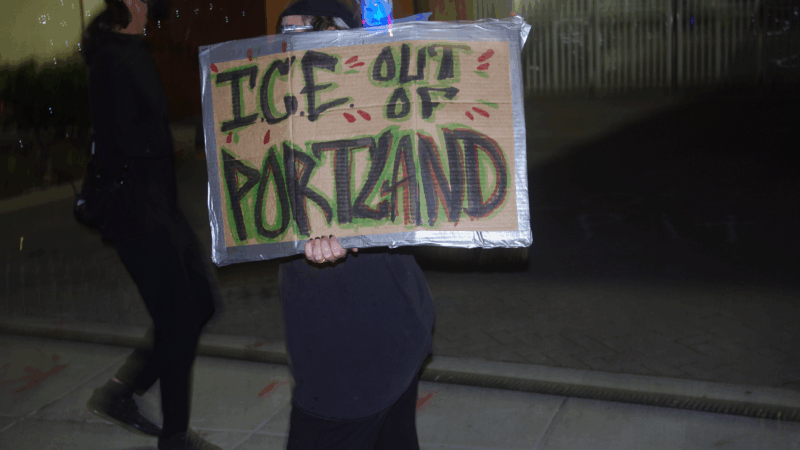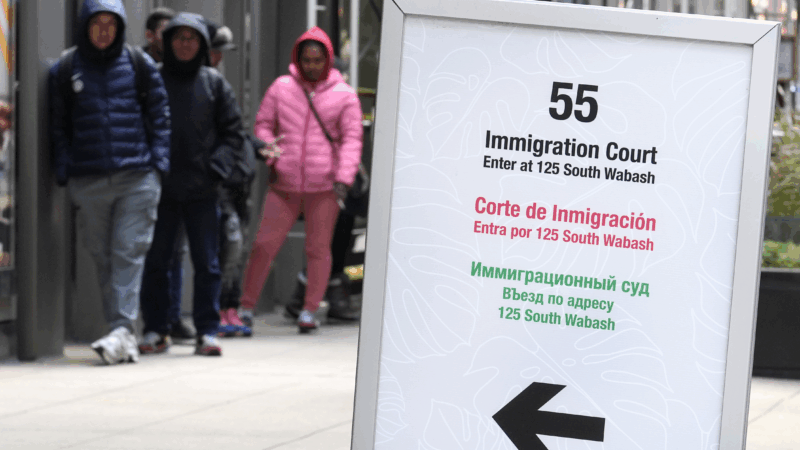Immigration arrests dip in July, and activists hope they’re partly responsible
Immigration arrests dropped nationwide in July, slowing the pace of President Donald Trump’s promised “mass deportation” just weeks after a sharp increase in June. According to U.S. Immigration and Customs Enforcement, its total “initial book-ins” went from 31,597 in June to 27,483 in July, a 13% drop.
ICE did not respond to NPR requests for comment, but in the past agency officials have said they need more officers and detention spaces to meet administration goals. With billions of dollars of new money from Congress, ICE has launched a drive to recruit more officers and build more detention facilities.
But in the near-term, protesters and activists believe they may be able to slow the pace of arrests and deportations. Oregon is a case in point.
Creating “noise” and “presence”
In Portland, demonstrators have gathered almost nightly outside ICE’s field office, yelling curses through megaphones and occasionally crossing onto federal property. Federal officers have responded by shooting pepper balls and other crowd-control weapons. The building’s lower windows are boarded up, covered with spray-painted curses aimed at the people working inside.
Chandler Patey, one of the few protesters who’s not masked, said the group’s presence keeps public attention on deportations. “We need to be here and we need to create some amount of noise and a presence here,” he says. “And when ICE is here, they’re not out kidnapping people, right?”

The protests have been going for more than two months, and sometimes just a few dozen people come out. They’re far smaller than the protests outside of Portland’s federal buildings in 2020.
Nevertheless, ICE has capitalized on the image of its Portland office under siege, and this summer White House “border czar” Tom Homan has twice pledged to go to Portland. So far there’s no sign he has.
The late-night protests have also angered some nearby residents, and one has sued the city to get police to enforce its noise ordinance.
Despite the protests and the plywood, the ICE facility is still functioning. During the day, people with immigration cases are let in for “check-ins,” and some are detained. Government cars still come and go — though they often require an escort down the driveway by armed officers.
“Rapid-response” system may also play a role
The greater impediment to large-scale arrests may be the “rapid response” system run by the Portland Immigration Rights Coalition and other non-profits. They run a state-wide hotline that collects ICE sightings and quickly connects arrestees with legal help.
Isa Peña is director of strategy for Innovation Law Lab, one of the groups involved. She says one strategy, when they get word of an arrest, is to file a habeas corpus petition asking a court to review the legality of the detention, before ICE can transport someone to the nearest overnight detention center, across the state line in Tacoma, Wash.
“If we are able to file a habeas petition in Oregon, we have gotten orders from the judge that the individual cannot be removed out of the state,” Peña says. “Because ICE does not have any detention facilities [in Oregon], they are often let go.”
The fact that ICE doesn’t have an overnight detention center in Oregon makes it harder to rack up arrest totals here —which lag behind neighboring states. According to data collected by the Deportation Data Project, the state saw only 103 arrests in June, and 67 from July 1-29.
“Sanctuary” states continue to get federal criticism
Another factor complicating ICE’s efforts is Oregon’s long-standing “sanctuary” law, which limits the ability of local police and jails to hand over potential immigration law violators unless the federal agents have a warrant.
The state also funds legal services for non-citizens facing immigration charges.
Earlier this week Homeland Security Secretary Kristi Noem was on Fox News, criticizing “sanctuary” jurisdictions that offer this kind of aid to people accused of immigration violations.
“These individuals that are in our country undocumented, they’re breaking our laws,” Noem said. “What I find so astounding by so many of these leaders in these sanctuary cities and in these sanctuary states is that they’re willingly encouraging and protecting people who break our laws.”
In response to this kind of criticism, Isa Peña says she doesn’t think the hotline system and legal aid is making it harder for ICE to do its job.
“We are asking them to do their job correctly, which means that they have to abide by the Constitution,” Peña says.
Lindsey Vonn says she suffered ‘complex tibia fracture’ in her Olympic downhill crash
The 41-year-old star said her torn ACL was not a factor in her crash. "While yesterday did not end the way I had hoped, and despite the intense physical pain it caused, I have no regrets," she wrote.
Guerilla Toss embrace the ‘weird’ on new album
On You're Weird Now, the band leans into difference with help from producer Stephen Malkmus.
Nancy Guthrie search enters its second week as a purported deadline looms
"This is very valuable to us, and we will pay," Savannah Guthrie said in a new video message, seeking to communicate with people who say they're holding her mother.
Immigration courts fast-track hearings for Somali asylum claims
Their lawyers fear the notices are merely the first step toward the removal without due process of Somali asylum applicants in the country.
Ilia Malinin’s Olympic backflip made history. But he’s not the first to do it
U.S. figure skating phenom Ilia Malinin did a backflip in his Olympic debut, and another the next day. The controversial move was banned from competition for decades until 2024.
‘Dizzy’ author recounts a decade of being marooned by chronic illness
Rachel Weaver worked for the Forest Service in Alaska where she scaled towering trees to study nature. But in 2006, she woke up and felt like she was being spun in a hurricane. Her memoir is Dizzy.






